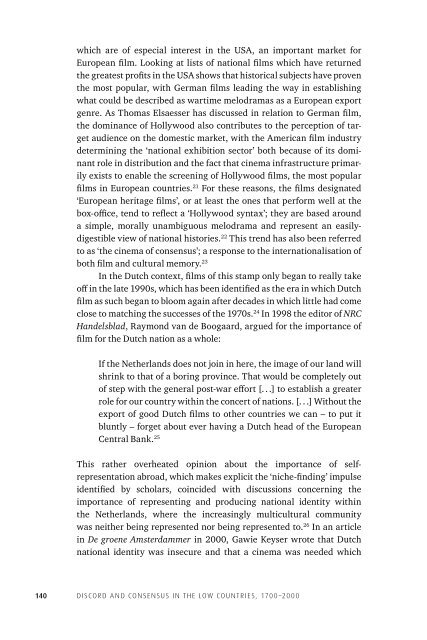Discord Consensus
7aze300jFJo
7aze300jFJo
Create successful ePaper yourself
Turn your PDF publications into a flip-book with our unique Google optimized e-Paper software.
which are of especial interest in the USA, an important market for<br />
European film. Looking at lists of national films which have returned<br />
the greatest profits in the USA shows that historical subjects have proven<br />
the most popular, with German films leading the way in establishing<br />
what could be described as wartime melodramas as a European export<br />
genre. As Thomas Elsaesser has discussed in relation to German film,<br />
the dominance of Hollywood also contributes to the perception of target<br />
audience on the domestic market, with the American film industry<br />
determining the ‘national exhibition sector’ both because of its dominant<br />
role in distribution and the fact that cinema infrastructure primarily<br />
exists to enable the screening of Hollywood films, the most popular<br />
films in European countries. 21 For these reasons, the films designated<br />
‘European heritage films’, or at least the ones that perform well at the<br />
box-office, tend to reflect a ‘Hollywood syntax’; they are based around<br />
a simple, morally unambiguous melodrama and represent an easily-<br />
digestible view of national histories. 22 This trend has also been referred<br />
to as ‘the cinema of consensus’; a response to the internationalisation of<br />
both film and cultural memory. 23<br />
In the Dutch context, films of this stamp only began to really take<br />
off in the late 1990s, which has been identified as the era in which Dutch<br />
film as such began to bloom again after decades in which little had come<br />
close to matching the successes of the 1970s. 24 In 1998 the editor of NRC<br />
Handelsblad, Raymond van de Boogaard, argued for the importance of<br />
film for the Dutch nation as a whole:<br />
If the Netherlands does not join in here, the image of our land will<br />
shrink to that of a boring province. That would be completely out<br />
of step with the general post-war effort [. . .] to establish a greater<br />
role for our country within the concert of nations. [. . .] Without the<br />
export of good Dutch films to other countries we can –to put it<br />
bluntly –forget about ever having a Dutch head of the European<br />
Central Bank. 25<br />
This rather overheated opinion about the importance of self-<br />
representation abroad, which makes explicit the ‘niche-finding’ impulse<br />
identified by scholars, coincided with discussions concerning the<br />
importance of representing and producing national identity within<br />
the Netherlands, where the increasingly multicultural community<br />
was neither being represented nor being represented to. 26 In an article<br />
in De groene Amsterdammer in 2000, Gawie Keyser wrote that Dutch<br />
national identity was insecure and that a cinema was needed which<br />
140<br />
DISCORD AND CONSENSUS IN THE LOW COUNTRIES, 1700–2000


